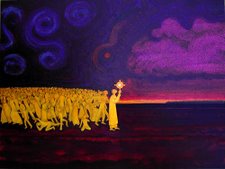
I'm taking a break from all the politics and theology and foreign films and dramas and documetaries and 'worthy' shit --I'm going back to basics, and will try to stay away from this electronic crack pipe interweb for a while and try and get some stuff done. So adios, reader[s?] - I am off to watch Rocky Balboa and drink some Jamesons...
Check out the reviews at RottenTomatoes
e.g:
ROCKY BALBOA
by Mark Bell
(2006-12-20)
2006, Rated PG, 102 minutes, Metro-Goldwyn-Mayer (MGM)
I spent the better part of my life in South Jersey, about 10 miles outside of Philadelphia. Most of my extended family and loved ones still call the area home. I offer up this bit of information because I’m admitting to a bias of being a Philadelphia loyalist all the way through. And beyond the Liberty Bell, Phillie Phanatic, soft pretzels and cheesesteaks, few things are as inherently Philadelphia as the character Rocky Balboa. Hell, a statue of Rocky (a fictional character) stood outside the Philadephia Spectrum for 25 years before being moved to the bottom of the Philadephia Museum of Art's steps. To know Philly and love Philly is to love Rocky. And I love Philly, which is why the latest installment in the “Rocky” franchise could be the greatest catastrophe (as if “Rocky V” didn’t already earn that status) or the most inspiring success...
...“Rocky V,” by and large, was a colossal disappointment and went a long way towards burying the Rocky franchise. What “Rocky Balboa” does is dig up the body and re-bury it, properly. When this film ends, and the credits begin to roll, there is finally closure for this franchise and for the Rocky character himself, as the final fight did what it needed to do, it sated and defeated the beast within. As a Philly loyalist, I was not disappointed at all with this effort, and at moments was even inspired. Stallone did what he needed to do, and he’s got my respect for taking all the criticism and flack just to end things the right way.












on March 11, 2007, 10:25 am